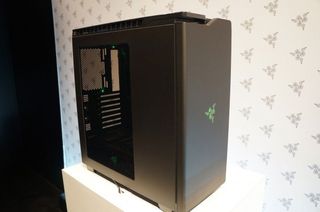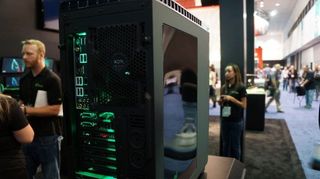Razer expands into PC cases with custom-designed NZXT H440

First Razer built mice and headsets and PC accessories. Then Razer built its own computers—the Razer Blade laptop and the modular Project Christine . Now the inevitable has happened: Razer's built a PC case. The company's big product reveal for E3 2014 is a custom Razer-designed NZXT H440 case, a sleek black obelisk with the usual neon green highlighting.
The NZXT H440 is part of Razer's "Designed by Razer" initiative, which means they didn't actually manufacture the case. Instead, they took a mid-tower case design from NZXT and ran it through Razer's design team in San Francisco, tweaking the materials and aesthetics to meet Razer's specifications.
As CEO and Creative Director Min-Liang Tan explained to me, those specifications cover thermals, engineering materials, and looks. Hitting a satisfactory thermal spec meant simulating airflow through the case with smoke. Adjusting the case to the Razer aesthetic meant tinting the side panel window's view of the interior and removing some color highlighting for a nearly all-black exterior.

While NZXT's original model costs $120, Razer's will launch at $150 in July. That's not cheap, considering Cooler Master sells some great cases for $80-$150 . But it's also not the only case Razer has planned—Tan said other sizes are in the works.
For more on the NZXT H440 and the other gear Razer had at E3, check out this tour of their E3 booth from our friends at TechRadar .
PC Gamer Newsletter
Sign up to get the best content of the week, and great gaming deals, as picked by the editors.

Wes has been covering games and hardware for more than 10 years, first at tech sites like The Wirecutter and Tested before joining the PC Gamer team in 2014. Wes plays a little bit of everything, but he'll always jump at the chance to cover emulation and Japanese games.
When he's not obsessively optimizing and re-optimizing a tangle of conveyor belts in Satisfactory (it's really becoming a problem), he's probably playing a 20-year-old Final Fantasy or some opaque ASCII roguelike. With a focus on writing and editing features, he seeks out personal stories and in-depth histories from the corners of PC gaming and its niche communities. 50% pizza by volume (deep dish, to be specific).
Most Popular


